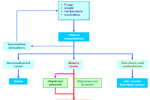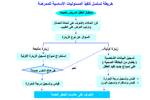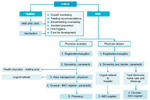Organization of work at the health facility
Rationale
Introducing a quality care intervention in a health facility requires a good situation analysis to plan for all its key supporting elements, in order to prepare the facility for implementation.
It is also recognized that adhering to the IMCI protocol (Integrated Management of Child Health) to manage a child under 5 years old takes time. This may be a constraint in a busy facility with a high case-load if all tasks are carried out just by one health provider with no sharing of responsibilities with other staff at the same facility.
The issue is then how to deliver the whole scope of quality child care efficiently rather than how to shorten the clinical process and miss some aspects of health care. In fact, all aspects of child care recommended in IMCI are important to promote child health and should be included in the management of each child.
One approach that has been used in the Region is the re-organization of the work at a health facility where more than one health provider works—including physicians, medical assistants, nurses, midwives, health volunteers, etc., re-distributing tasks in order to deliver quality care efficiently within the available resources. Three key steps have been identified for this purpose (see below): triage, clinical management and counselling.
Triage
When sick children are taken to a health facility, they should be quickly assessed for a number of danger and severe signs to identify those who are severely ill and who need to be seen by the physician or medical assistant without any delay. For example, a child who is lethargic or unconscious, unable to drink or breastfeed, having convulsions or 'vomiting everything' needs urgent attention.
The basic skills to perform these tasks can be taught in a training course for paramedical staff which specifically focuses on triage.
Other tasks can also be carried out before the child is seen by the clinician, such as weighing, taking the temperature, checking the immunization status, etc. Children who are (very) low weight-for-age and require feeding counselling are in this way identified in advance, as are those who are febrile and require assessment of specific signs and symptoms.
Selected categories of health providers have been trained in newly assigned tasks in shorter and competency-based courses in some countries, such as Egypt, Syrian Arab Republic and Tunisia.
The pre-screening of sick children, achieved through training and re-distribution of tasks, saves time and may have a positive effect on the overall management of the child.
Clinical management
It is very helpful to integrate clinical protocols as much as possible. In fact, the health provider who delivers services at primary health care level is usually the same person, irrespective of whether the guidelines come from one programme or another.
This effort towards integration of clinical management guidelines has been a characteristic of IMCI. IMCI uses a holistic approach to the management of the child and the guidelines guide the health provider through the key steps of the clinical process, from assessment to classification, treatment and counselling.
If triage of children is performed, the physician or medical assistant can then use his or her time to concentrate on the clinical examination of the sick child and prescription of treatment.
Country-adapted IMCI protocols are currently followed as the standard for the management of under-5 children in countries and areas in which IMCI is being implemented.
To emphasize the importance of counselling as a key task in case management, many countries in the Region request the physician or medical assistant to carry out this task as part of the IMCI approach, while in others this is delegated to paramedical staff. The decision as to who should carry out this task depends also on the staffing situation at the health facility.
Country-adapted IMCI guidelines
Counselling
Counselling caretakers of children is a key aspect of the overall management. Most child care is delegated to child caretakers at home, whether it is related to the administration of drugs (e.g., antibiotics, antimalarials, oral rehydration salts, etc.), feeding, administration of fluids, or timely care-seeking. Thus, caretakers need to be properly counselled.
Counselling requires interpersonal communication skills that are often either not or inadequately taught at medical and allied health professional schools. It is often perceived by health providers as a time-consuming and less important task.
The result is that caretakers are often poorly advised on how to care for their children at home and unlikely to care for them properly, as surveys suggest.
Despite the consultation with the health provider, then, the child may not receive proper care, the outcome may be poor, more consultations may be required as the child's condition does not get better or worsens, and some of the family and health system resources invested will have been wasted.
IMCI training and follow-up emphasize the importance of counselling. Counselling can be performed by the physician or medical assistant themselves, or by other staff available at the facility, such as nurses, nutrition educators, health volunteers, etc., after proper training.
Given the importance that nutrition counselling plays in child health, the Regional office’s Child and adolescent health and development programme has undertaken a revision of the WHO training materials on breastfeeding counselling, based on regional experience in conducting these courses. The training materials on “Counselling on Infant and Young Child Feeding” include also a section on complementary feeding and feeding in special circumstances. They are currently available in Arabic. There are plans to translate them into English.
Regional training materials on "Infant and Young Child Feeding Counselling"
Preparing the health facility
It is important to prepare the health facility before staff are trained in IMCI, to ensure that clear responsibilities have been assigned to the staff at the facility and work has been organized and rearranged to reflect the case management tasks that are taught in the training course according to the IMCI guidelines.
This preparatory work is strongly advocated in the Region. Preparation has included the following steps in several countries (see section on IMCI implementation for individual country experiences):
reviewing staff’s responsibilities;
re-arranging the flow of patients;
making drugs and key supplies available; and
central or district team’s monitoring of the preparatory work, to support the process and ensure that facilities are ready for implementation.
The flowcharts developed in Djibouti, Egypt and Tunisia as part of IMCI are examples on how work is organized at a facility in which IMCI is implemented: the flowcharts refer to all children taken to the facility as an entry point, whether they are taken for an illness or to the well-child clinic.
 Organization of work flowchart, Djibouti
Organization of work flowchart, Djibouti  Organization of work flowchart, Egypt
Organization of work flowchart, Egypt  Organization of work flowchart, Tunisia
Organization of work flowchart, Tunisia


